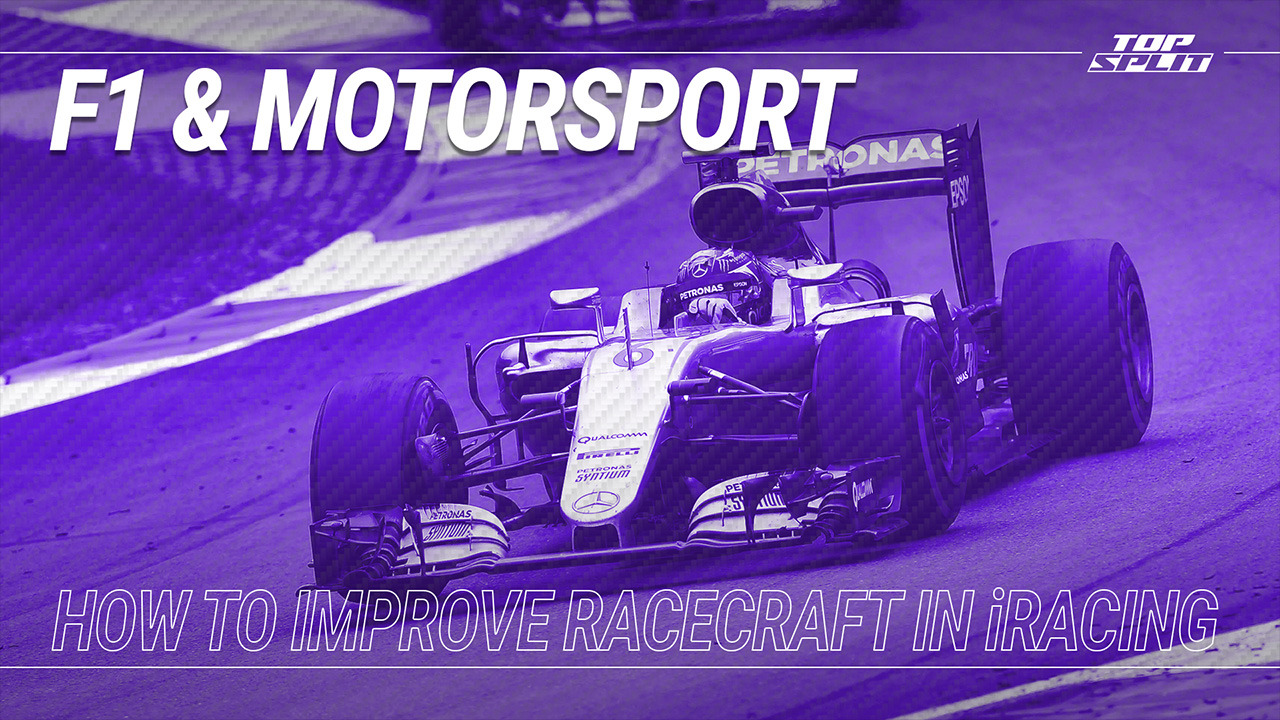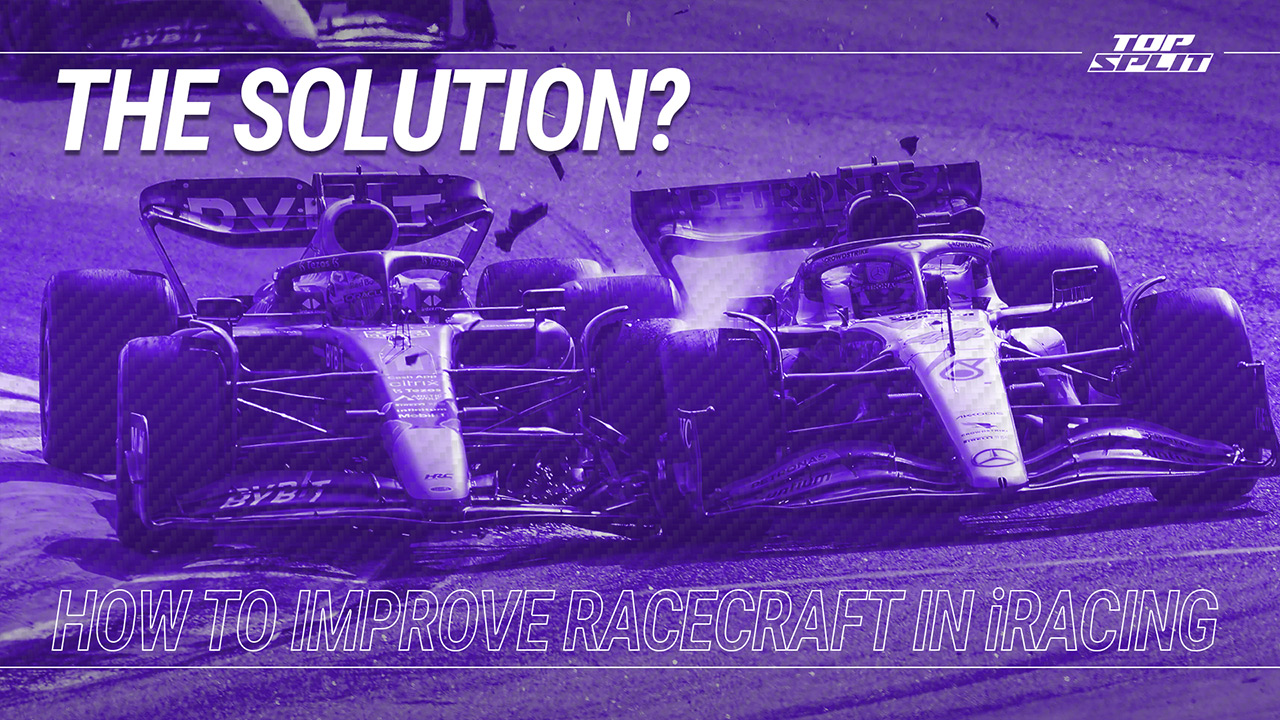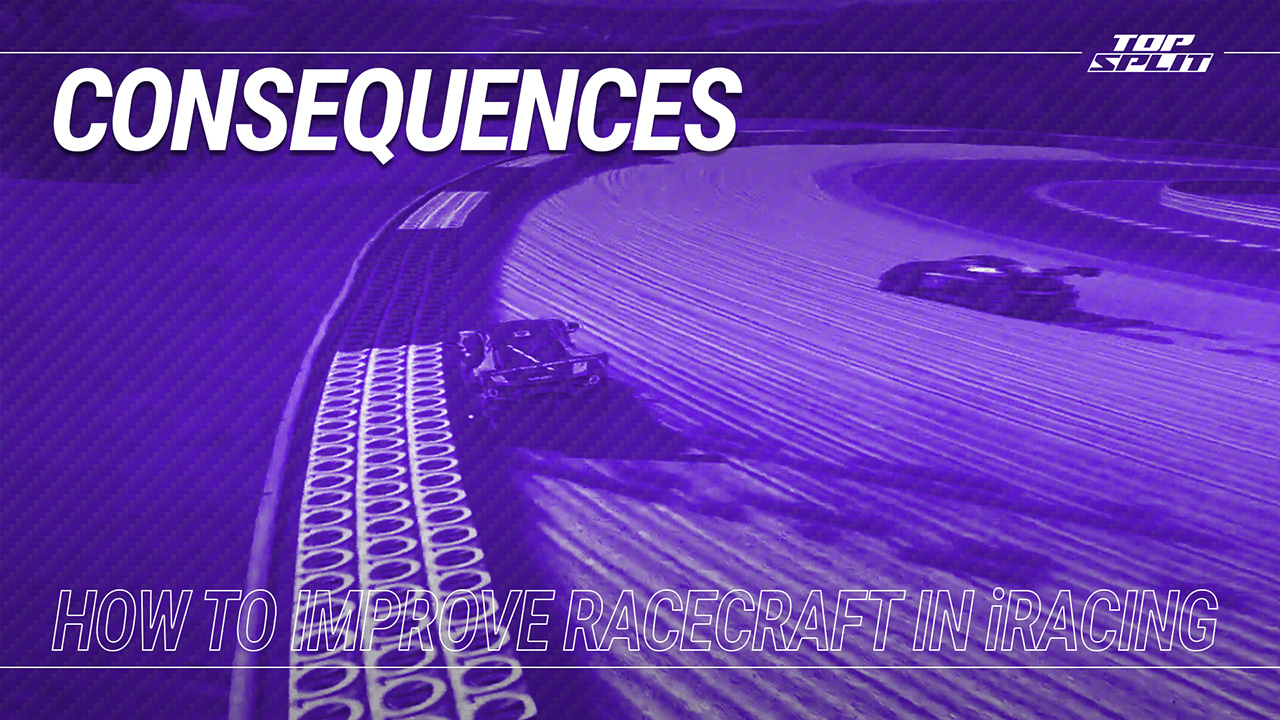Sim racing YouTubers are talking about it, and we’re sure you’ve noticed it too. Why is racecraft so bad right now, and how do we fix it?
WATCH: Racecraft in iRacing SUCKS. Here’s How We Fix It.
In the past few weeks, Ben at La Broca Sim Racing and DJ Yee-J have made videos about the big problem that all sim racers are aware of this year, particularly if you drive in iRacing – the absolute state of racecraft right now, and how in 2023 we’re seeing the worst driving standards, across all levels of sim racing, we’ve ever seen.
Ben focuses on the lack of patience on road courses in particular, DJ discusses a whole range of factors including the examples being set by top-level oval drivers, the physics engine, the new damage model, the widening of the talent pool and more, so if you want to hear their perspectives – which I highly recommend – I’ve embedded their videos below.
I agree with both of them, but I also think there’s some big factors that haven’t really been discussed yet, so I’m going to dive deeper into what I believe two of the biggest contributing factors are to the poor racecraft we’re seeing right now – and how we can take steps to make it better.

Image: TOP SPLIT
1. FORMULA 1 and Motorsport
Over the past few years, the FIA has come under increased scrutiny for the lack of clarity and consistency in stewarding across all of their racing series, but particularly in Formula 1.
From race to race, incident to incident, drivers are increasingly getting away with moves that would see them penalised in other racing series – and as the most popular form of motorsport in the world, many fans believe the aggressive moves they see are just the acceptable way to race.
The most striking example of this is drivers failing to leave racing room, pushing their opponents off-track, forcing them to back out of moves or putting them in dangerous positions. In most top-level racing series, these moves are a slam-dunk penalty – and indeed by the letter of the law, they should be – and have been – penalties in F1 as well, the most recent example that springs to mind is Schumacher being given a 10-place grid penalty for pushing Barrichello almost into the wall at the 2010 Hungarian GP.
However, in recent years, we’ve seen these sorts of moves increasingly become the accepted way to overtake or defend a position, particularly after Rosberg’s defensive move on Hamilton on the last lap of the 2016 Austrian GP, and Verstappen’s move on the inside of Leclerc at the same corner three years later.
WATCH: The one quality too many sim racers lack!! (La Broca Sim Racing)
This isn’t even a problem exclusive to motorsport. The 2023 Tour de France has just wrapped up, and the Green Jersey – typically given to the best sprinter – was won by Belgium rider Jasper Philipsen; but not without controversy, as on at least 3 occasions he made questionable moves that put other riders in danger – but escaped without punishment.
Aggressive racers have always pushed the limits and created a “new normal” when it comes to racing etiquette. In my eyes, for athletes and racing drivers at the top of their game, I can understand them pushing the boundaries and a certain level of leniency in stewarding – but the problem for us as sim racers is that race fans around the world watch these aggressive moves in F1, then jump into the simulator and believe these moves are OK to attempt, and are “just a part of racing”.
This issue is being compounded right now as sim racing is in the middle of a boom period, with more new sim racers than ever before, many of whom look up to or are influenced by their favourite real-world drivers. As iRacing becomes more accessible and more prominent, these new racers are jumping from more casual racing titles such as F1 23, GT7 and others into the iRacing service – taking not just the influence of real-world drivers at the highest level, but also the accepted driving standards in those games.
Aggressive racing doesn’t just mean failing to leave racing room, it extends to weaving on straights, moving in the braking zone, overtaking off track and more – just because the world’s best drivers do it in real life doesn’t mean it’s OK to race like that in the simulator. The drivers performing these moves are world-class athletes at the top of their sport, racing at a level far, far beyond your average sim racing enthusiast – and even then, they don’t always pull these moves off successfully.

Image: TOP SPLIT
The solution? This is a massive ask from a complete nobody I know – and with the way F1 is headed, the chance of this actually happening is increasingly slipping away – but we need to return to clear, consistent and effective stewarding in top-level motorsports to stop this slippery slope in its tracks.
With the revolving door of stewards at each F1 race, there’s no consistency to how the rulebook is applied. Is pushing another driver off the track allowed? Is it a penalty? If I overtake off track, should I give the position back or not?
Once there’s consistency and clarity at the highest level, it’s much simpler for everyone to know what is acceptable and what isn’t. Rules and regulations in each sim racing title can then be based off these real-world rules that are widely understood, and sim racers can fight on-track knowing what is and isn’t OK for them to do. To be clear, I’m not saying what the rules and regulations should be, I’m just saying they should be clear, consistent, and easy for everyone to understand and follow.
Looking back at the Schumacher-Barrichello incident at Hungary 2010, the move Schumacher pulled was inherently dangerous, and although there’s a debate to be had on if a 10-place grid penalty was too little or too much, I think most would agree a penalty of some kind was in order because of the risk of harm that move created. That brings me onto my next point.

Image: TOP SPLIT
2. Consequences
First and foremost, whether at your local karting circuit, a track day or at the highest-level, being a racing driver in the real world puts a huge responsibility on your head. Not only are you responsible for your own safety, you’re also responsible for the safety of everyone around you; other drivers, mechanics in the pit lane, marshals – anyone you can expect to encounter when behind the wheel.
Throughout most of the last century, poor racecraft didn’t just lead to a wrecked car, it could lead to lives being lost. Today, with motorsports thankfully safer than it’s ever been before, drivers are able to take more risks with the knowledge that their actions are unlikely to result in physical harm.
This is why flagrant abuses of respect between racing drivers, such as Dan Ticktum’s intentional crash in 2015, Santino Ferrucci’s deliberate post-race contact in 2018, and Luca Corberi throwing his front wing at another racer and then assaulting him in parc ferme in 2020 are rightfully criticised by the racing community, and the book comes down on them hard – Ticktum getting a 1-year ban, Ferruci a 4-race ban and Corberi a 15-year ban. If you do something that endangers another driver, you can expect to face strict consequences.
WATCH: Racecraft on iRacing is at its WORST EVER: A Rant (DJ Yee-J)
In sim racing, where the inherent danger of motorsports is eliminated entirely, this knowledge that you’re physically safe, no matter what happens, leads to more aggression, more incidents, and more ruined races. At worst, an intentional crash leads to a short ban. At best, an intentional crash leads to one ruined race and no further punishment.
We all agree that those who deliberately take out a rival deserve harsh punishment – but that’s not the biggest problem in sim racing. Unsafe rejoins, drivers that don’t hold the brakes when they crash, and those that move their damaged cars unpredictably across the circuit are incidents that are far more common – and seem to be becoming more and more regular this year.
Ben from La Broca talked a lot about patience on track. When you drive a real car, “impatience” leads directly to danger and the risk of injury for yourself or others. When you drive a virtual car, there is no danger, and therefore there’s little incentive to rejoin in the safest possible manner. A driver who spins on Lap 1 has two choices; rejoin safely at the back of the pack, or take a risk to rejoin more quickly but perhaps cause an accident and ruin the race for another driver. Given the choice, and the lack of consequences for getting it wrong, many sim racers will gladly take the risk, cause an accident, and just quit and join another race if it goes wrong.
Penalties in iRacing are severe compared to other sims, but still not severe enough to deter bad behaviour and poor racecraft. If they were, Verstappen wouldn’t have taken out Sven Haase a few weeks ago, and Jimmy the wannabe alien in your lobby wouldn’t reverse back onto the racing line after spinning out on Lap 1, then blame you for hitting him.
It’s not for any of us to tell others how to enjoy their sim racing – but when you race for real, there’s real consequences for yourself and others. Those consequences simply don’t exist in sim racing, and because of that, you can understand why it may be difficult for some to afford other sim racers the same level of respect on-track as they’d afford them if they were racing for real.
WATCH: 5 Changes iRacing Can Make to Improve Racecraft (DJ Yee-J)
Last weekend, I raced in iRacing’s 24 hours of Spa. A teammate took the start, and was immediately spun at La Source by an aggressive driver behind, with no real penalty for doing so. Come the end of the race, at least 40% of the entries in our split did not finish, typically because of over-the-top aggression, poor racecraft or just bad driving standards.
The essence of good racecraft is knowing when to attack, when to defend, and when you’re beat. The first two most racers have, the third – not so many, however it’s possibly the most important of the three. Being able to take the fact that you’ve lost a position at the start and have time to improve, or that you’re likely to lose that position on the last lap will lead to better results over time. I’m not saying you shouldn’t fight tooth and nail for important positions, I’m saying it’s important to weigh up all the information available to you, and decide if the risk is worth the reward.
No driver can win every race. No driver never makes a mistake. Verstappen might be winning every F1 race right now, but at some point, there will come a race that for whatever reason, he simply can’t win.
Ultimately, I agree with DJ Yee-J – racing is an inherently selfish sport, and the real value of iRacing as a service comes from the ability to race hard but fair against other people, so when poor racecraft ruins the experience of your races, it harms the value of iRacing.

Image: TOP SPLIT
The solution? The consequences for consistent poor racecraft need to be much more severe.
With more new sim racers than ever before, this is easier said than done – how do you develop a system that’s fair, but also doesn’t require boatloads of manual oversight? In my view, a few tweaks could go a long way to making positive change.
As we need better stewarding in real-world motorsports, the same applies to top-level sim racing esports. Questionable moves should be penalised. Standards should be set. Consistent good driving should be the aim, and that will help trickle down to all racers on the service.
Moving to the general playerbase, the ability to lose race licences simply isn’t a strong enough deterrent against poor racecraft for many racers. As DJ Yee-J showed in his video, the average number of incidents per race appears to be higher than ever before – and if iRacing knows a drivers’ average incident points per race, they can take steps to help bring that down.
WATCH: Are These the WORST Driving Standards in iRacing? (Chris Rogers Sim Racing)
Let’s say the incident point DQ amount for a race is 16x. If a driver has averaged over 10x incident points across his past 5 races, that should raise red flags. Perhaps this triggers pop-ups in the UI as a reminder to race clean, or with tips for good racecraft? Perhaps it triggers an automatic cooldown whereby drivers cannot enter any races for an hour? Perhaps it points racers back to the official sporting code, or to the driving school?
There’s plenty of ways to guide racers in the right direction without having a major impact on their experience, and in ways that should make them a better driver that gets more enjoyment out of the service – and leading to the other people they race with having a better experience too.
When the current system effectively amounts to either a ban from the service or no punishment at all, there has to be a way to more proactively guide drivers with poor racecraft onto a better path, as the end result for that is better, more fun and more exciting sim racing for everybody.
Conclusion
Do I think it’ll get worse from here? In my opinion, no. Why? Ultimately, racecraft is a skill that develops with time, and whether you’re a naturally-talented star in the making or a newbie trying to be the next Max Verstappen, over time, most sim racers come to realise that good racecraft leads to better results.
If we have a clear, consistent standard for what’s acceptable in the top-tiers of real-world and simulated motorsports, and a sim racing service that actively promotes good racecraft amongst its drivers, existing sim racers will be motivated to stay, new sim racers will stick around, and at the end of the day, we can make sim racing better for everyone.
What do you think? Have you experienced a decline in racecraft lately? What are your ideas for making sim racing better? Let us know in the comments below.


